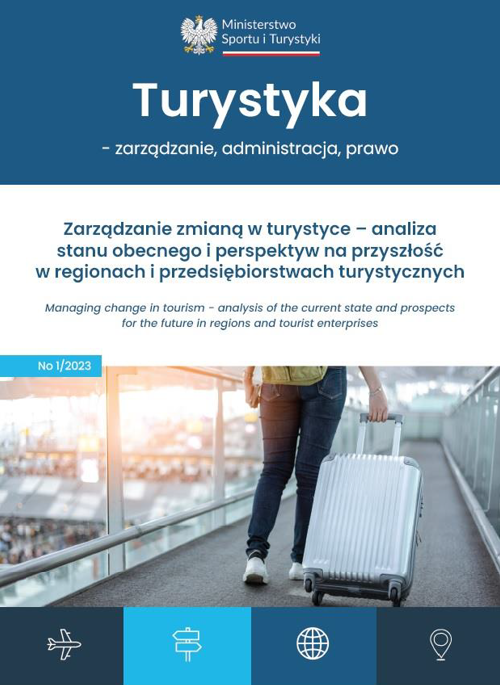Sposoby zapobiegania marnotrawstwa żywności w hotelach
Słowa kluczowe:
żywność, marnotrawstwo, hoteleAbstrakt
Marnowanie żywności jest obecnie problemem globalnym, a ilość odpadów dynamicznie rośnie mimo różnych inicjatyw mających na celu zminimalizowanie tego problemu. Problem ten dotyczy szczególnie branży hotelowej, a jego ograniczenie, za sprawą przesłanek rynkowych i korporacyjnych, nie zawsze jest łatwa. Celem artykułu jest identyfikacja metod ograniczania marnotrawstwa żywności w hotelach. Główną metodą badaczą był przegląd literatury. Zidentyfikowano następujące potencjalne obszary minimalizacji marnotrawstwa żywności w gastronomii hotelowej: analiza procesów, działania ograniczające zakupy i wykorzystanie odpadów, edukacja gości, rozwiązania systemowe i wykorzystanie koncepcji projakościowych, wykorzystanie urządzeń technicznych, korzystanie z lokalnych dostaw, współpraca z organizacjami charytatywnymi oraz produkcja biogazu i kompostu oraz żywienie zwierząt. Rekomenduje się ponadto prowadzenie dalszych badań empirycznych nad zidentyfikowanym obszarem problemowym.
Downloads
Bibliografia
Antonschmidt, H. & Lund-Durlacher, D. (2021). Stimulating food waste reduction behaviour among hotel guests through context manipulation, Journal of Cleaner Production, 329. doi: 10.1016/j.jclepro.2021.129709.
Baker, M.A., Davis, E.A. & Weaver, P.A. (2014). Eco-friendly attitudes, barriers to participation, and differences in behavior at green hotels, Cornell Hospitality Quarterly, 55(1), pp. 89–99. doi:10.1177/1938965513504483.
Chan, E.S.W., Okumus, F. & Chan, W. (2017). The applications of environmental technologies in hotels, Journal of Hospitality Marketing & Management, 26(1), pp. 23–47. doi:10.1080/19368623.2016.1176975.
Easterby-Smith, M., Thorne, R. & Jackson, P. (2015). Management and business research, Sage, Los Angeles-Singapore.
Frumkin, P. 2001. Hotels rethink dining-concept formats, alliances in face of softening economy, Nation’s Restaurant News, 35(14), p. 51.
Fu-Jin, Wang, Chia-Jen, Hung & Peir-Yuan, Patrick Li (2011). A study on the critical success factors of ISO 22000 implementation in the hotel industry, Pakistan Journal of Statistics, 27(5), pp. 635–643.
Gandhi, P. et al. 2018. Multicriteria decision model and thermal pretreatment of hotel food waste for robust output to biogas: Case study from city of Jaipur, India, BioMed Research International, 2018, pp. 1–13. doi:10.1155/2018/9416249.
Gandhi, P. et al. 2019. Hotel generated food waste and its biogas potential: A case study of Jaipur city, India, Waste and Biomass Valorization, 10(6), pp. 1459–1468). doi:10.1007/s12649-017-0153-1.
Gdzie marnuje się najwięcej żywności? Wcale nie w sklepach. Jest nowe badanie (businessinsider.com.pl, odczyt 29.04.2023).
Giamouri, E. et al. 2021. The food for feed concept. Performance of broilers fed hotel food residues, British Poultry Science, 62(3), pp. 452–458. doi:10.1080/00071668.2021.1877258.
Hotels see return on food waste reduction investment (2018), BioCycle, 59(6), pp. 6–7.
Jabeen, F. et al. 2023). Emotions and food waste behavior: Do habit and facilitating conditions matter?, Journal of Business Research, 155. doi: 10.1016/j.jbusres.2022.113356
Juvan, E., Grün, B. & Dolnicar, S. (2018). Biting off more than they can chew: Food waste at hotel breakfast buffets, Journal of Travel Research, 57(2), pp. 232–242. doi:10.1177/0047287516688321.
Kasavan, S. et al. 2022A. Drivers of food waste generation and best practice towards sustainable food waste management in the hotel sector: a systematic review, Environmental Science and Pollution Research, 29(32), pp. 48152–48167. doi:10.1007/s11356-022-19984-4.
Kasavan, S. et al. 2022B. Challenges for source separation of food waste and turning waste into compost for Island-Based Hotels, Akademika, 92(3), pp. 39–49. doi:10.17576/akad-2022-9203-03.
Lazić, B. et al. 2022. Assessment of restaurants food waste towards circular economy in transition country cities, Environmental Engineering & Management Journal (EEMJ), 21(7), pp. 1147–1156.
Lévesque, J., Perreault, V. & Mikhaylin, S. 2022. Food waste in a hotel foodservice: A case study identifying hot spots and strategies to prioritize towards a reduction, International Journal of Gastronomy and Food Science, 14, 100600. doi: 10.1016/j.ijgfs.2022.100600.
Mak, T.M.W. et al. 2021. A cross-region analysis of commercial food waste recycling behaviour, Chemosphere, 274. doi: 10.1016/j.chemosphere.2021.129750.
Milindi, P.S., De Lieto, F. & Chopra, S.S. 2022. Food Waste-Energy-Water-Emissions (FEWE) nexus in the food service sector: Comparing a restaurant meal from imported ingredients versus an imported ready-to-eat meal, Journal of Cleaner Production, 380. doi: 10.1016/j.jclepro.2022.134871.
Pirani, S.I. & Arafat, H.A. (2014). Solid waste management in the hospitality industry: A review, Journal of Environmental Management, 146, pp. 320–336. doi: 10.1016/j.jenvman.2014.07.038.
Sandaruwani, J.A.R.C. & Gnanapala, W.K.A.C. (2016). Food wastage and its impacts on sustainable business operations: A study on Sri Lankan tourist hotels, Procedia Food Science, 6, pp. 133–135. doi: 10.1016/j.profoo.2016.02.031.
Serving up some food for thought (2009). Hotel & Motel Management, 224(6), p. 46.
Subramanian, K. et al. 2021. Mapping the food waste-energy-water-emissions nexus at commercial kitchens: A systems approach for a more sustainable food service sector, Journal of Cleaner Production, 301. doi: 10.1016/j.jclepro.2021.126856.
Sun, Y., Qian, L. & Liu, Z. 2022. The carbon emissions level of China’s service industry: an analysis of characteristics and influencing factors, Environment, Development & Sustainability, 24(12), pp. 13557–13582. doi:10.1007/s10668-021-02001-y.
The banana index 2023. The Economist z 15.04.2023, s.77.
(Ustawa z 14 grudnia 2012 r. o odpadach (Dz. U. z 2019 r. poz. 701 z późn. zm.).
Wrona, A. 2022. Tona jedzenia miesięcznie ląduje w koszu. Jak nie marnować żywności w hotelach? (horecatrends.pl),odczyt 29.04.2023.



